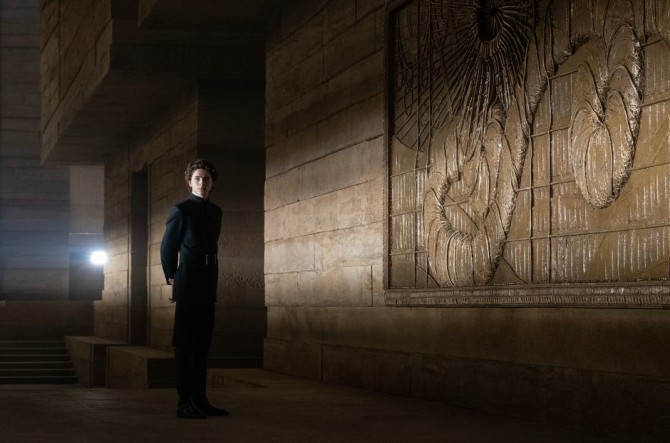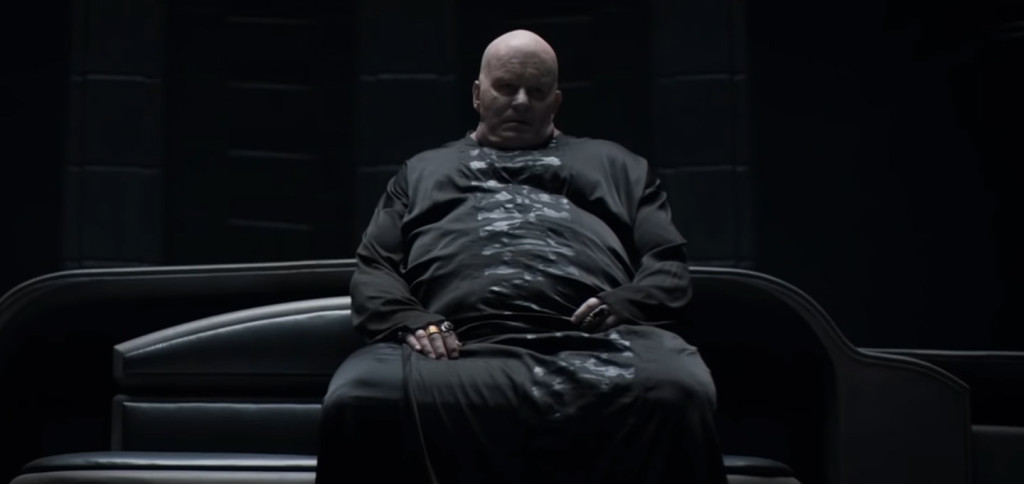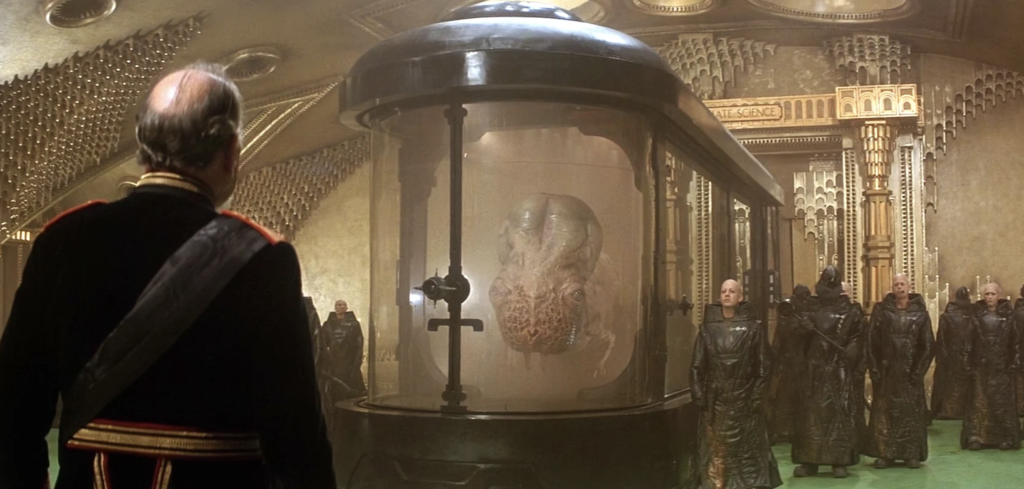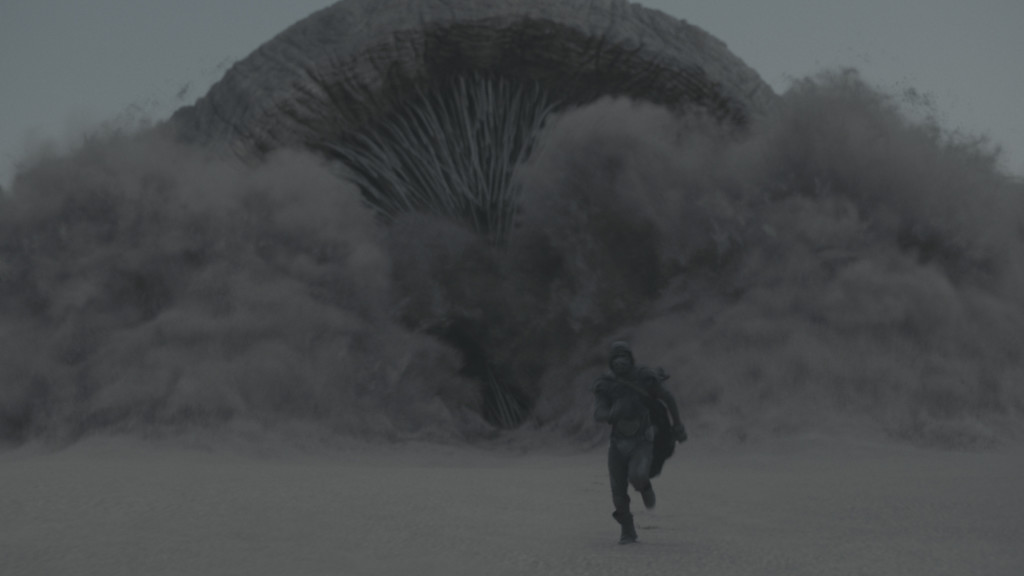Genre: Sci-Fi/Drama
Premise: A family is entrusted with a planet that produces the most valuable energy source in the galaxy – spice.
About: Dune’s long perilous journey to the big screen is finally over. The film was released in theaters this weekend, as well as simulcast on HBO Max. It pulled in 40 million dollars, the largest post-pandemic haul yet for an HBO Max simul-release. The movie comes from visionary sci-fi director Denis Villeneuve (Arrival, Blade Runner 2049). Everyone’s asking the question, “Is a 40 million dollar opening enough to greenlight a sequel?” Well, I hope so considering the first movie didn’t have an ending. Dune is doing pretty well with critics (82%), and a little better with moviegoers (91% on RT and 8.3 on IMDB).
Writers: Jon Spaihts and Eric Roth and Denis Villeneuve (based on the novel by Frank Herbert)
Details: 2 hours 35 minutes
I should’ve been worried when I read this headline over the weekend: “Denis Villeneuve claims Tenet is a masterpiece.” But, if I’m being truthful, I was worried about this film all the way back when I saw the original trailer. My initial thoughts were, “This looks like it has the potential to be REALLY boring.” And, unfortunately, that’s Dune’s biggest battle. Fighting off its fits of boringness.
The problem here is Denis Villeneuve. Denis is a very talented filmmaker. But he wasn’t built to direct big-budget movies. He was built to create smaller artsier fare. There are large swaths of this movie that feel like a Terrance Malick film. And while that works with limited audiences made up primarily of cinephiles. It might as well be nuclear waste when selling it to mainstream audiences.
In Denis’s defense, there are so many things working against Dune as a feature film that one finds it hard to believe it would work in any capacity. The worst part of it is the story itself, which seems designed to be boring. The Atreides family is handed the planet Dune, which produces the main energy source of the galaxy, ‘spice.’ The plot that occurs for the next 60 minutes is anyone’s guess. But it can basically be boiled down to “people in rooms talking,” a screenwriting death sentence for a feature film.
After what seems like forever, the film finally comes alive when the Emperor orders the other clans to attack and destroy the Atreides family. But Denis finds a way to make even that boring, as we’re soon watching Timothee Chalamet and his mom spend ten entire minutes inside an underground tent having the most boring conversations known to man. It is one poor story choice after another here.
If that wasn’t bad enough, the movie ends out of nowhere, as if everyone on the production team realized, all at once, “Um, this story goes nowhere so why continue telling it?” In cutting the movie off so abruptly, they seem to have erased an entire character, the blue-eyed girl played by Zendaya, who was so heavily involved in the marketing that you might have expected her to have upwards of 2 hours of screen time. Try 5 minutes. All of which is in Timothee Chalamet’s dreams.
There are some lessons to learn from this screenwriting disaster. So let’s get into those.
There are way too many “two people in a room talking” scenes. A lot of you gave me crap for bemoaning 2PIART scenes but this movie shows you exactly how dangerous they can be to a story’s momentum. This is a giant production. So why do you have so many 5-6 minute scenes of two people talking in a room?? It’s egregious.
Even worse, nobody shows any emotion in this movie. Every character is muted. Everyone speaks monotone. Everyone looks serious. This is a classic beginner screenwriting mistake. You believe that if you muzzle emotion, your movie will come off as more “serious” and “thoughtful.” But all it does is make every single scene that has characters in it boring.
You can get away with one character being like this. You can’t get away with a dozen characters being like this. At a certain point, people need to show emotion. That’s what audiences connect with because we’re all emotional creatures. When something bad happens, we want the character to be mad. Or sad. When something good happens, we want to share in their happiness. There is no emotion in this movie at all. And when you combine that with the stark lifeless backdrops, it feels like we’re in the world’s biggest indie flick.
Another screenwriting 101 mistake – when you have a major team-up in your screenplay – characters who are going to have a lot of screen time together – you want those two characters to have the most interesting conflict-filled relationship possible. Why? Because they’re going to make up 50-60-70% of the movie we watch. So if there’s no interesting conflict between them, you could have up to 70% of your movie with two characters who have zero interesting moments together. Dune makes the inexplicable decision to team Timothee Chalamet up with his mother. The two have absolutely nothing interesting going on between them. They just mumble back and forth to each other for 150 minutes.
And the thing is, they actually had the opportunity to create some conflict here. One of the first things Chalamet’s mom does is send him into a trial where, if he fails, he dies. Mom trying to kill you is a pretty good starting point for a conflict-heavy dynamic that’s going to need a lot of work to resolve. However, Chalamet holds no ill-will towards his mother after her attempted assassination of him. He shrugs it off and goes back to mumbling.
Another thing I tell writers is that when you’re writing sci-fi or fantasy, stick with two sides: the good guys and the bad guys. That way, we’ll never be confused. However, if you have three sides, or in Dune’s case, four sides, there’s going to be a good chance we’ll be confused by what’s going on. That’s exactly what happens here. The Emperor decides to take down House Atreides. Is the Emperor part of a House himself? No idea. Is he completely on his own? Maybe. When people did start to attack House Atreides, which House were they a part of? Information not available.
I’m not even sure what House Atreides’ job is. Are they only harvesting and distributing the spice? Or do they now own the planet and, therefore, own the spice itself? This matters because if they own the planet, it makes sense that others would want to go to war with them, so they could have the planet themselves. But if they’re just harvesting for the greater good of the galaxy, it makes less sense that anyone would want to attack them.
And this isn’t insignificant information here. This is at the heart of what the movie is about. If we don’t know what the rules are, how can we appreciate the nuances of any sort of attack on them? I know Dune is not trying to be Star Wars. But I understood what the central conflict of Star Wars was within ten minutes. It just seems like nobody sat down and said, “We have to figure out how to make this conflict understandable and accessible.”
Even stuff that should be easy to understand is confusing. Why is spice red but the people who live among it and are supposedly overcome by the toxicity of spice – their eyes are blue? That seems like a no-brainer to make those two things the same color.
It reinforces, to me, that Dune is not meant to be a feature film. I’m not sure it’s meant to be anything other than a novel. But, if it has any chance of being a media product, it definitely needs the length of a TV show to set all of this elaborate mythology up.
The directing in this movie isn’t that good either, to be honest. The movie looks pretty. But I’m not sure that’s the point of making Dune. One thing I noticed was how empty the movie felt. George Lucas was famous for his obsession with filling up the frame. He wanted his world to be so vibrant and exciting that it would seem like there were ten other movies going on in the background of the movie he was telling.
Denis is the opposite of that. He finds gigantic empty rooms and puts two characters in them and has them speak for 10 minutes. After doing this enough times, the world begins to feel so empty as to be insignificant. I mean is all this squabbling that’s going on for a few thousand people? Because that’s what constant empty frames makes it feel like.
Another Denis issue is that he doesn’t make a single exciting choice in the entire movie. I’m no defender of the original Dune. But Lynch makes a couple dozen exciting choices in that movie. Where is that here? For all the lauding of Villeneuve, his sci-fi imagery and his characters are standard. That’s the one area where you could’ve made your movie stand out. Instead you opted to create a boring political indie film with some pretty desktop wallpaper backdrops.
Did I like anything in the film? Yes. I liked the sand worm stuff. In particular that first scene where the sand worm is coming and the ship breaks down and they have to improvise. That was a cool scene. And then there are a couple of other sand worm scenes that rocked as well. Denis did a great job of creating that looming dread of one of those things coming your way.
Ironically, I think the sand worm scenes expose what’s wrong with Dune. Which is that, the scenes prove that they’re the only sequences you can actually do anything with in the feature format. Those attacks were built for the big screen. But nothing else was. It’s scene after scene after scene of two characters speaking in giant empty rooms. And it’s proved to me that Denis needs to be making smaller movies. This big stuff isn’t his forte.
Despite my desperation for a good sci-fi movie, I can’t recommend Dune. There’s way more bad here than good.
[ ] What the hell did I just stream?
[x] wasn’t for me
[ ] worth the read
[ ] impressive
[ ] genius
What I learned: Readers need to understand the central conflict of your movie. In Infinity War, it’s Thanos trying to snap half the population out of the universe. In Star Wars, it’s the Empire trying to permanently squash the rebellion. In Dune it’s…. What exactly? That’s right. There is no central conflict. Well, until the Emperor decides to take down House Atreides. But that doesn’t happen for 80 minutes. This is basic stuff. The fact that nobody on the Dune team understood it is somewhat baffling.





